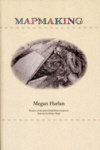Mapmaking
Mapmaking is last year’s winner of the John Ciardi Prize for Poetry, awarded annually by the University of Missouri-Kansas City’s BkMk Press. Harland’s book was selected by Sidney Wade, who praises the book as “imaginative writing at its best.” These are quiet poems, by which I mean they are never ostentatious or particularly bold or inventive. And they do not pretend to be. They rely instead, and successfully, on powerfully insightful and compact instances of poetic precision and emotional and philosophical acuity. “Picture a New York gone infinite, // a little pearly,” Harland writes; understand a morning as having “a bird’s worth of restlessness”; and a fossil is a perfume; and walking on Clare Island, the poet traverses “a place that lived beyond its future.”
Mapmaking is last year’s winner of the John Ciardi Prize for Poetry, awarded annually by the University of Missouri-Kansas City’s BkMk Press. Harland’s book was selected by Sidney Wade, who praises the book as “imaginative writing at its best.” These are quiet poems, by which I mean they are never ostentatious or particularly bold or inventive. And they do not pretend to be. They rely instead, and successfully, on powerfully insightful and compact instances of poetic precision and emotional and philosophical acuity. “Picture a New York gone infinite, // a little pearly,” Harland writes; understand a morning as having “a bird’s worth of restlessness”; and a fossil is a perfume; and walking on Clare Island, the poet traverses “a place that lived beyond its future.”
The artifacts of our lives, the places where we spend time (a nightclub, a deserted island, a childhood memory), the scenes we witness in nature, history and its monuments, are all markers, places of one kind or another on the maps of our lives. “Family is a shore never reached” (from “Nativity”). Emptiness is “the soaring inside of the church.” Myths are “tethered to actual place.” Limbo is a “motel room” (who hasn’t experienced that!). Time passing is a “coral reef / accreting tidal alphabets.” Our fate (our fortune) is a series of lines on the palm: “engraved with the wit of genetics.”
Harland’s poems are propelled forward by a kind of easy, fluid energy, but they halt themselves, periodically, in small, concentrated moments of lyric or philosophical intensity: “city metabolized my stories whole,” “travel is how love pretends to change,” and “now the story plagiarizes grief.” Harland is always restrained and cautious, seldom buoyant or despairing, but deep emotion is the fossil life of her poems, imprinted on every line, as evidenced in the book’s opening poem, “Ex Libris,” quoted in its entirety:
Here is the fossil as a perfume. Here is a bone
picked clean and whittled into a tiny tall ship.
Here are magicians teaching secrets
to contortionists. Here is colored glass on fire.
Here is scripture forged into the memory of water.
Here are rosettes, exposed wiring, teasings onto the brink.
Here is the full vista of an hour, and the sun.





